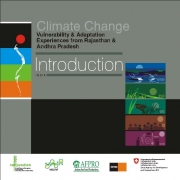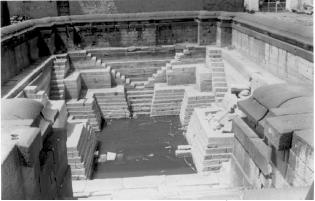/sub-categories/research-papers
Research Papers
Dr. O.P. Rupela's paper, presented at the 3rd Biennial Convention of OFAI at Anand, Gujarat
Posted on 18 Jan, 2011 02:34 PMDr Rupela in his keynote address to the organic farming association of India does mention SRI along with several other desirable practices for a 'cool' or climate friendly agriculture. Some of us met him recently at the national workshop. Let us hope this article and his work will inspire many more researchers to work closely with farmers on sustainable agriculture.
Annual climate summary of India during 2010 - Press release by India Meteorological Department
Posted on 17 Jan, 2011 12:06 PMContent courtesy: Indian Meteorological Department
Mean annual temperature for the country as a whole during 2010 was +0.93 0C above the 1961-1990 average. It was slightly higher than that of the year 2009, thus making the year 2010 as the warmest year on record since 1901.
Considering different seasons, Pre-Monsoon season (March-May) in 2010 was the warmest since 1901 with mean temperature being 1.8 0C above normal
The annual total rainfall for the country as a whole was normal during the year 2010 with actual rainfall of 121.5 cm against the long period average (LPA) of 119.7 cm.
Conservation of urban lakes as potential sources of freshwater - Paper presented at the National Seminar on Water and Culture (2007)
Posted on 09 Jan, 2011 11:52 PMThe author sees the need for the conservation, maintenance and management of these ancient water bodies for the supply of water to cities. The author suggests that there is need to integrate traditional wisdom with modern water resource management.
Apotheosis of water and its inevitability in Indian culture - Paper presented at the National Seminar on Water and Culture (2007)
Posted on 09 Jan, 2011 11:23 PMThis paper highlights the role and value of water in ancient times. The author begins with analysing the discussion on water in the Rig Veda and it's deification. The paper points out to the link between various Hindu gods and water. Social mores in the context of water use is also highlighted, taboos like no nude bathing in rivers and no excretion into such water bodies is pointed out.
Climate change: Vulnerability and adaptation experiences from Rajasthan and Andhra Pradesh – A report by SDC
Posted on 05 Jan, 2011 06:44 PM This document discusses the process oriented programme of Swiss Agency for Development and Cooperation (SDC) on Vulnerability Assessment (V&A) and Enhancing Adaptive Capacity to Climate Change initiated in the semi-arid regions of India. The aims of this programme include strengthening the resilience of local communities to conditions of unfavourable weather, like adverse alterations in temperature and precipitation leading to the more frequent occurrence of drought and to use the experiences for policy development for climate change adaptation measures at various levels.
This document discusses the process oriented programme of Swiss Agency for Development and Cooperation (SDC) on Vulnerability Assessment (V&A) and Enhancing Adaptive Capacity to Climate Change initiated in the semi-arid regions of India. The aims of this programme include strengthening the resilience of local communities to conditions of unfavourable weather, like adverse alterations in temperature and precipitation leading to the more frequent occurrence of drought and to use the experiences for policy development for climate change adaptation measures at various levels.
Over 60 per cent of the cultivated area in India is rainfed & unfavorable and uncertain rainfall patterns will seriously affect the food, drinking water and livelihood security of millions of children, women and men. Since the initiation of this project, the emphasis on proactive research on adaptation mechanisms has increased at the national level.
The present decade may mark the beginning of a new climate era, characterized by extreme and often unpredictable weather conditions and rise in sea levels. The greatest casualty of climate change will be food, water and livelihood security.
Civil society consultations for the 12th Five Year Plan Approach Paper: Urban & Rural WATSAN sector
Posted on 30 Dec, 2010 11:20 AMAt the request of the Planning Commission, Arghyam and WaterAid agreed to co-ordinate and support a process of civil society consultation for inputs on rural and urban domestic water and sanitation for generating recommendations for the Approach Paper to the 12th Five Year Plan of the Government of India.
A glimpse of the audience
Influence of Chalukya architecture on Hampi stepwell - Paper presented at the National Seminar on Water and Culture (2007)
Posted on 29 Dec, 2010 04:16 PM
This paper discusses the reasons for building tanks in ancient India and mentions ancient texts like 'Samarangan Sutradhar' to indicate how wells and other water bodies were constructed.
These water storage systems indicate the knowledge of geology, soil engineering, construction engineering and structural engineering in ancient times.
Blueprint for farm growth
Posted on 28 Dec, 2010 03:12 PM
Since the start of the 11th Five Year Plan, the growth rate in agriculture has virtually remained stagnant. A scene at a paddy field in the outskirts of Hyderabad.
Guidelines for water safety plans for rural water supply systems by the Sulabh International Academy of Environmental Sanitation
Posted on 27 Dec, 2010 07:20 PMThis document by the Sulabh International Academy of Environmental Sanitation presents the guidelines for water safety plans for rural water supply systems. The revised National Rural Drinking Water Programme (NRDWP) Guidelines 2009-2012 issued by Rajiv Gandhi National Drinking Water Mission, Department of Drinking Water and Sanitation has shifted the focus from source development and installation of water supply system for providing drinking water supply to rural household to focus on development of village security plan.
Preparation of strategic plan for rural drinking water sector in India – A draft discussion paper by the Department of Drinking Water Supply
Posted on 26 Dec, 2010 07:27 AMThis draft discussion paper by the Department of Drinking Water Supply (Ministry of Rural Development) deals with the preparation of strategic plan for rural drinking water sector in India. The Government of India introduced the Accelerated Rural Water Supply Programme (ARWSP) in 1972–73 to support States and UTs with financial and technical assistance to implement drinking water supply schemes in order to accelerate the pace of coverage across rural India.
